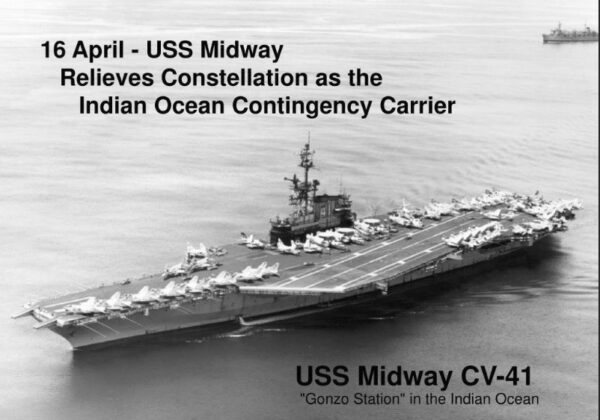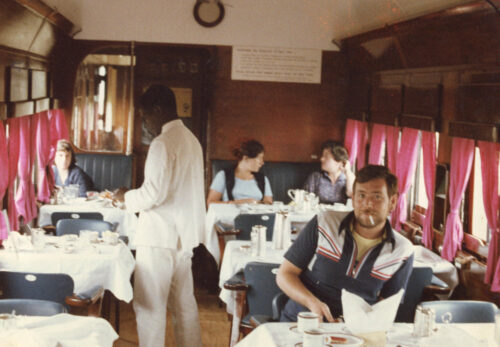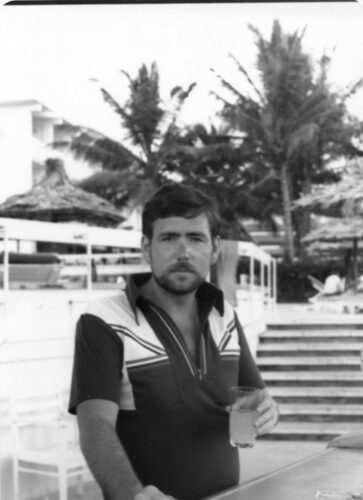Night Train to Nairobi, 1979

Editor’s Note: This element of travel tales has lingered for a while. The date on it may be a notional one- it reads “10 June 1979,” which must have been an ancient date scrawled later to signify celebrating a 28th birthday in a place far away. The claimed copyright is dated in the year of 2001, or a couple decades ago, and involves large steel ships like the one above, and trains managed by a former Colonial power. Cabs driven by people unconcerned with international developments. The picture below is from the breakfast serving on the Night Train that runs from the coastal city of Mombasa, headed for Nairobi, the capital of Kenya. That is a marvelous nation on the western shore of the Indian Ocean with real lions and tigers and bears, oh my. Our aircraft carrier, USS Midway (CV-41) was anchored in imposing manner close in to the Beach. There was emotion in the four-day port visit, since the rumor mill indicated we were headed for the North Arabian Sea and confrontation with the new Iranian Revolutionary Government that had just unseated the Shah. The word this week, in this time, is that the Mullahs may be able to crank out an atomic weapon in only a dozen days. Since we have been in a state of tension for for more than forty years, we thought a look back would give some perspective on what is still to come. The younger Iranian folks, women and men, are protesting some of the unpleasantries imposed by the religious zealots in charge. That is a slightly newer version of life in what was Persia. This is just an account of travel by planes, trains and automobiles from another time.
– Vic
Night Train to Nairobi

The word was out and it was all over the ship, from Flag Mess to the third butter-cutter. The port visit to Australia was cancelled; some damned fool in the National Command Authority had taken it in his head that the deteriorating situation in Iran required our presence in the Gulf of Aden more than a presence with the fair ladies of Perth. It was an obvious case of misplaced priorities. The gloom onboard was thick enough to stop a Land Rover. We now had to gird our loins for another thirty days- at least- on the bounding main. And in the same place, talking about Oman and the Russian anchorages in the Red Sea, as well as the various flavors of warring factions who infest the blasted desert of the immediate neighborhood. In the day, we just called them “ragheads,” but that is insensitive, and we have evolved.
I suppose we had done too good a job of impressing the white-robed Saudis when they came out to see our 35-year old aircraft carrier, salving their collective jitters at the specter of the militant hard edged Shias rising in Iran across the Gulf.
Our immediate local reaction was that there was absolutely no reason to conserve anything in Africa: neither money, nor sleep, nor precious bodily fluids. We had 72 hours left ashore, and no prospects of liberty before we hit Subic Bay again in the Philippines at some point in the distant future. Accordingly, Jambo and I immediately booked passage on the celebrated Night Train to Nairobi, with reservations at the legendary New Stanley Hotel. Return passage was assured with first-class airline tickets. Once the travel agent at the hotel lifted that large sum of shillings from our wallets, there was nothing left to do but watch the rain, the girl from Spain, and the gin and tonics on the plain.
We drank by the pool of the Nyali Beach Hotel watching the drenching of the establishment grounds. The Spanish girl did not put her robe back on, rain or no, and there were six Marines and elements of three squadrons and two departments watching her throw darts. It was delicious to do nothing at all. All we had to do was kill time. We watched the enormous spiders walk around their parachute-sized webs, disconcerting for someone awakening after a long evening. One guy looked up from his drink and saw one of the monsters crouched on the window behind the bar. He jumped about a foot.
The beauty of the Night Train was that it did not leave Mombasa station till 1900. We were fabulously toasted by the time it came to pack and leave Nyali Beach for the station.
We passed the last moments getting smashed with some Brits who flew the 707-jets of Pelican Airways. They were headed into Rwanda. Fascinating bunch of people. One of the engineers had just returned from a local garage to fix a piece of the aircraft hydraulic system. Perhaps it was not fixed to Royal Air Force standards, but it would get them airborne for their two hops the next day. There are no roads to Rwanda, and everything from matches to petroleum must be flown in, sometimes on the same flight. There is money to be made in a place where the gas lines are two-days long. Also, there is a profit to be had in ferrying bridges, military gear and weapons into Uganda. Idi Amin Dada had just ordered the British Ambassador to crawl to him on hands and knees to secure the release of a British national prisoner of the state.
Much of what the aircrew said was fantastic. Tales of war in the bush, Tanzanian guerrillas against Idi’s troops. A war that, contrary to what we read in Western media, was very much still on. This morning the headlines of Kenya’s state newspaper The Nation shouted that “fifty civilians had been slaughtered on a train” trying to get out of the north. There were many Ugandan refugees in Kenya, and the OpEd page decried the loss of tourism entailed by the bad publicity.
The Brit aircrew was were having a marvelous time, and I began to understand that some of the cargo they carried was weapons. They were an outfit that could have fit well into the old Air America organization- a cut-out for covert supply in a region where Her Majesty’s government might desire plausible deniability. I had the suspicion that Mrs. Thatcher was going to make Idi pay for the humiliation of her diplomat. We were working on a plan to accompany the Brits on the shuttle the next day down to Kilgali when Jambo’s wristwatch chimed that it was time to be on our way. We cruised out of the hotel and discovered the rain had let up. We negotiated a fare with a cabbie out front for the ride down to the rail station.
It was outrageous; they wanted five shillings a kilometer, and it seemed like every place you wanted to go was about fifty kilometers away. The hell with it, we said. After all we were headed for action and excitement. We agreed on 65 shillings as the price and off we bombed in the back of a red diesel Mercedes, honking like a wild beast in search of its mate. We scared pedestrians for about twenty minutes and roared up to a covered wrought-iron archway in front of a ramshackle white building. We hopped out, paid our bandit, and walked to the gate. We were instantly surrounded by beggars, hangers-on, and fellow travelers. I had a bad feeling for a moment, but it vanished the moment the kind black man waved us through. “Don’t worry ‘bout your tickets. You show ‘em on train. Come on ahead.” He smiled and nodded as we walked past into another time.
The train waited on the siding next to a long platform under an iron-supported old wooden roof. Cracked cement was under foot. The vegetation gave off a delicious perfume, and the wet dirt and dark people scattered along the platform echoed Bogart and a hundred Hollywood sets beckoning mystery and intrigue. We adjourned to the little open-air bar halfway down the platform to discuss the adventure to come. We ordered Tusker lagers and ogled the European women grouped at the end of the counter. Only one guy with them. The situation called out for intervention, but the moment passed without issue. We drank till it was time to depart.
We flowed out to the train and found our car. Climbing up the steps we entered the era of British East African Rail. Our compartment was huge; a big vinyl bench and another ready to fold down above. We were almost settled when we realized we were under-resourced. I raced from the train to buy more beer. When I got back, Jambo was standing outside the car and laughing. “Hey, Vic! There’s dozens of women on the train!” We’ve died and gone to heaven…
While we stood exploring our good fortune, we were approached by a Black man in worn trousers and white shirt. He had a solemn and erect sort of dignity. I have been panhandled all over the world, but this man had them all beat.
“Good evening, gentlemen.’ His face was indistinct in the darkness. “I hate to approach you in this fashion, but as it happens I am far from my home, and I am defeated. I have not the money to travel and I was hoping you could find it in you to help me.” He spoke in curious precise English, the vowels round. His use of the word ‘defeated’ knocked me out. I dug out all the pennies and shillings coins in my pocket and handed them over. I have never been so easily separated from my money. It seemed like the tithe one had to pay for the journey.
They turned the power on in the train and the compartment lights began to glow softly. We climbed aboard and hung out the window with everyone else. Good-byes were exchanged up and down the line. At last, and with no warning, the train began to creep up the track. We passed out of the lighted area and watched the children lining the roadbed to watch the train go by. We curved out of the switchyard and through an area of coffee warehouses.
I went back into our compartment and watched out the other window. Jambo demonstrated how to turn on the fan. I played with the table the transformed itself into a sink. I drank more of my beer. The porter came by and brought down the upper bunk with a twist of a key shaped like a cold chisel. It was an old train; well kept up but frayed on the edges. It had obviously been in service for some time. Jim left to explore. I watched a refinery slide by to our right. The flame from the excess tower lit the night, visible for miles. We left the city and entered the bush. It began to soak in. We would be passing by Mount Kilimanjaro in about six hours. Jambo returned and reported there was a target-rich environment. Many more women on the train. Things were looking up.
The porter stopped by again and inquired as to whether we would desire the first or second seating for dinner. I had a handle on the situation from my old Amtrak days; I asked for the second seating. The waiters would be in less of a hurry to get us cleared out. It was delicious to sit and drink coffee and look at the people. In the meantime, I had another beer. At six-forty five we heard musical chimes advancing down the passageway. It was the porter with four tubular chimes. He banged them with a wooden mallet and it was music. It had a syncopated beat and a lilt that belied the limited range. His music grew loud as he passed the car and diminished as he moved forward. The first sitting filed dutifully aft. Among them were two very attractive Europeans.
I caught only the long red skirt in detail, but it was intriguing. Once, as I was packing to leave on an extended train trip, my mother inquired if I was taking any good clothes. I looked at her quizzically; I was still heavy into blue jeans for my all-purpose apparel. She looked at me with a smile. “You never know who you might want to meet on the train.”
Well, in 1975, the only people you met on Amtrak are retirees, hippies, and sexual degenerates. But she was harking back to an era when you actually might meet an elegant someone on the night coach to New York. I had a feeling we had stumbled into the same era lingering on in Africa. Pity we hadn’t selected the first sitting, I thought.
We explored more of the train during the wait for chow. I continued my world travels with a trip to the head to offload processed beer, while Jambo, blue eyes flashing above his moustache, lurked the corridors for unattended women. I achieved success, Jim, not really. At length the musical porter made his rounds again and we headed for vittles.
The restaurant car was worth the price of admission alone. White ceiling, dark wood walls. Neat table settings. Tables for two on the left-hand side of the aisle, parties of four on the right. We were seated with two African gentlemen. In the rear sat two older Americans, who Jambo informed me were two oceanographers from the National Oceanographic and Atmospheric Administration (NOAA) ship Researcher, currently anchored in the Mombasa roadstead. We did not talk to the Africans next to us. They were very demanding of the service staff, almost abusive. We, of course, were too drunk to care, and we kept our Ugly American masks off for use at a later date.

(A last vista from Nyali Beach Hotel before boarding the Night Train to the Capital. Photo Jambo, 1979).
I was picking up some very weird vibes. There was an African gentleman in a camouflage bush jacket with cropped hair who kept giving me the fish eye. I hadn’t defiled anyone in his family, to my knowledge, so that left a series of possibilities. It was either political or racial, and I wasn’t sure that the two things weren’t the same thing in this neck of the veldt. Remember, there is a war going on in Uganda. Kenya is a member of the Organization of African Unity, of which not all members have the enlightened policy of racial tolerance exhibited by the Kenyan government.
I kept getting a mental picture of the British overlords sitting in the very same car, doing all the great colonial things we have come to hate in these late decades of Uhuru. And seeing these same masters blown to pieces around the smoking wreckage of a Land Rover in 1960. Maybe I was just projecting my American racism on situation I couldn’t understand. Any time you are outnumbered like this at home, you feel uneasy. Here it was the natural run of things. I had found most of the Kenyans very friendly, but still there was a nagging feeling…
Jambo and I thought the service first rate. We were catered to by a very dark man with a head shaved smooth as a bowling ball. His massive shoulders and neck erupted out of his dazzling white starched mess jacket. His collar was vast. His movements were graceful. I had the feeling I should take whatever he served me. We started with a fish course, very delicate, followed by a lamb curry. Our table mates were most demanding. Did we get better service because we were on the aisle? Tough question. I just enjoyed the food, and the rich Kenyan coffee was superb.
We lingered in the wood-paneled luxury after the rest of the diners began to file out. We asked if it would be all right if we had a drink after dinner. They assured us it would be. The porters began setting up for breakfast the next morning, and Jambo and I moved to a clear table with our drinks. Almost immediately, the oceanographers joined us. They were also bombed. We had a splendid conversation as we piled up more of the little airline bottles of gin. One was a grandmother and the other was a weather-beaten gent from Alabama who looked remarkably like Bear Bryant. We talked shop and travels. Jambo emphasized the travails of Carrier Aviation. They emphasized the joys of being paid overtime for duty at sea. I had to admit they had something there.
What they also had was a bottle of vodka burning a hole in their suitcase back in the compartment. We decided to go into close session with it and hope for a view of Kilimanjaro by moonlight. No small amount of urging was required once we found that immediately adjoining their compartment was the one occupied by our mysterious European ladies. The only note that clashed was the dude in the camouflage jacket who continued to eyeball us through our impromptu party. We didn’t know where they kept Americans where he comes from.
Copyright 2001 Vic Socotra
www.vicsocotra.com
